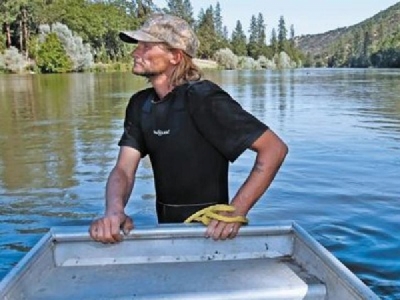
Posted on September 18, 2018
A federal appeals court upheld Oregon’s ban on suction-dredge mining in the Rogue River and other wild salmon streams Wednesday, rejecting miners’ arguments that federal mining laws trump state law on public land.
Miners say they may appeal a 9th U.S. Circuit Court of Appeals panel’s ruling that the ban championed by the late state Sen. Alan Bates and supported by the federal government does not infringe on the right to mine under federal laws, but bans only one form of mining and only in some streams.
Those streams were identified in Oregon law as “essential salmon habitat,” or those necessary for spawning and rearing of wild salmon and steelhead. That covers reaches throughout Western Oregon, such as the Rogue River and its tributaries below Lost Creek dam, the Applegate River below Applegate Dam and the Illinois River, but leaves most of salmon-less Eastern Oregon open to suction dredging.
Suction-dredge mining employs a floating vacuum to suck gravel from a stream bottom. Materials vacuumed by the dredge then go through a sluice to allow miners to strain out gold and other heavy metals, while sand, silt and other fine materials are discharged into the water.
Wild-salmon advocates say the process damages spawning grounds and rearing habitat. Miners have argued that current laws already protect salmon and their habitat, and they have argued that no peer-reviewed study on suction dredging proves it ruins salmon habitat.
In the ruling, the appeals judges acknowledge that “unreasonable, excessive or pretextual state environmental regulations” can violate the intent of the federal mining laws.
“We agree with the United States, however, that in this case that line has not been crossed,” the ruling states.
Winning attorney Pete Frost of Eugene said today’s ruling was an affirmation on an important prohibition in efforts to restore wild salmon and their habitat.
Frost, of the Western Environmental Law Center, also considered it a posthumous tip of the cap to Bates, the fly-fishing Medford physician who championed the effort but died from an apparent heart attack in 2016, a year before the law passed the Legislature.
“It’s a outcome for all of the people who have been working on this for three decades now,” Frost said. “And I’m happy for Bates. He was after this for a long time.”
The miners’ lawyer, James Buchal of Portland, said he would like to see the decision appealed to the U.S. Supreme Court, but he had not discussed an appeal with his clients.
Miners argued in court that the law, known as Senate Bill 3 and passed by the 2017 Oregon Legislature, didn’t regulate suction-dredge mining but prohibited it, in contrast to mining laws that supersede what Buchal argued was a state land-use planning law.
Buchal called his arguments “a road-map for how it should have been decided and will be decided by the Supreme Court” if the appeal is filed and the high court chooses to hear it.
Miner Rick Barclay from the Galice Mining District, which was one of the appellants, said it is possible the miners will appeal to the entire 9th U.S. Circuit Court of Appeals next.
Oregon saw a spike to almost 2,000 permitted suction dredgers in 2012 as California banned the operations. In 2013, the Oregon Legislature passed a Bates-pushed bill that rolled back and capped permit numbers. Later, a temporary ban was put in place until what eventually became Senate Bill 3 was passed.
Source: Mail Tribune





